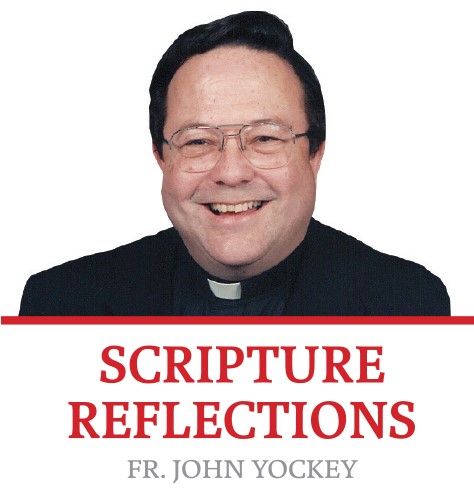Scripture Readings
Exodus 22:20-26
1 Thessalonians 1:5c-10
Mathew 22:34-40
30th Sunday in Ordinary Time
At a graveside service one gorgeous August afternoon, we commended to the Lord a highly effective theology teacher at Catholic Memorial High School, Waukesha (1990-2009), Mrs. Linda Johnson.
Her classes began with a scripture reading followed by spontaneous prayer. Students would raise up whatever was on their hearts. Discussion progressed, and she’d weave in course material she had prepared. Then she’d tie everything together with her motto: “See, it’s all connected.”
That theme succinctly describes a shining jewel of our Catholic Tradition, the Church’s cohesive social doctrine. Pope Francis highlights the interconnected basics – life issues which are inseparable – in his authoritative teaching, the encyclical “Laudato Si.” (Care for Our Common Home, 2015)
“To blame population growth instead of extreme and selective consumerism by some, is one way of refusing to face the issues.” (#50)
“There can be no ecology without an adequate anthropology,” an adequate understanding of the person and human dignity. (#118)
Since everything is interrelated, concern for the protection of nature is incompatible with the justification of abortion. How can we teach the importance of concern for other vulnerable beings, however troublesome or inconvenient they may be, if we fail to protect a human embryo, even when its presence is uncomfortable and creates difficulties?
“If personal and social sensitivity towards the acceptance of new human life is lost, then other forms of acceptance that are valuable for society also wither away.” (#120) Sexual exploitation of children and abandoning devoted care for the elderly are examples he cites of what follows permissive abortion. (#123)
Our American bishops are respectfully in sync with the Bishop of Rome, their head and the center of their communion with each other. Together, our shepherds hand on the experience of the Risen Christ: the immigrant boy Jesus, the carpenter from Nazareth, the herald of God’s Reign, the compassionate healer of the sick and troubled, the special friend of sinners and the marginalized, the Savior of the entire human family, now our Eucharistic food and drink as we journey into eternal life.
Faithful to this living tradition, Pope Francis and his brother-bishops show us how it’s all connected. By word and example, they invite us to respect life in every marvelous way Christ continues to live among us. With him, there are no single issues or stand-alone concerns. He calls us to be of service wherever we meet him in the wonder of creation, in supportive fellowship, in everyday need.
At the same time, our living tradition hands on a moral absolute, a primary prohibition against the unjust taking of innocent human life.
The apostles and early evangelizers were shocked when they brought the Gospel to the larger Roman Empire. They were horrified that abortion and infanticide were so widely accepted. Their sense of the faith recoiled at such desecration. The Son of the Father who became the son of Mary sanctified her womb as he grew within her to full term. First, he took upon himself the ultimate vulnerability of a preborn baby. Later as an adult, he made defense of the vulnerable in any context the cornerstone of his prophetic ministry.
Catholic Tradition sees meaning in the lived sequence Emmanuel embraced with his divine self-emptying. (Philippians 2:1-11) Jesus was truly human. Conceived by the Holy Spirit, he began as an embryo, not a knight in shining armor.
Our American bishops adapt themes from Christ’s example to address major challenges facing us today. They reissued their 2015 pastoral letter, “Forming Consciences for Faithful Citizenship: A Call to Political Responsibility” (available online), to help us do what the title suggests this election year, 2020.
Forming our conscience correctly in line with Catholic teaching is a moral imperative, flowing from Christian baptism, so we can participate responsibly as the Lord builds up the holiness of our civic community. The letter reminds us of a consistent ethic of life, necessary for our individual well-being and society’s as a whole.
The right to life itself enjoys a “preeminent priority,” because it directly protects innocent human life during the fragile beginning or final phase of a unique person, whether wanted or unwanted. (Introduction) Pope Francis was grieved to learn that 61 million preborns have been aborted since 1973. Various state legislators are opening the door to infanticide, now focused on babies who survive abortion but silent about where such atrocity can lead.
Once we legally ignore God’s sovereignty over human life, enshrined in the Declaration of Independence, respect for life as such is seriously corroded. We must stand up to urge renewal.
Faithful citizenship requires active, pro-life involvement to help heal the abscessed wound of racism still raging across our country. The immigrant family of Jesus, Mary and Joseph call us to voice the concerns of vulnerable, asylum seekers at our borders. Health reform, an urgent work still in progress, requires our personal involvement in the critical deliberations very much under way.
Cardinal Francis George, OMI, the late Archbishop of Chicago, summed up the place of official church teaching to guide our discernment process, especially when we prepare to vote on the direction these United States should take: “Bishops don’t claim to speak for every baptized Catholic. Bishops speak, rather, for the Catholic and apostolic faith. Those who hold that faith gather with them. Others go their own way.”

